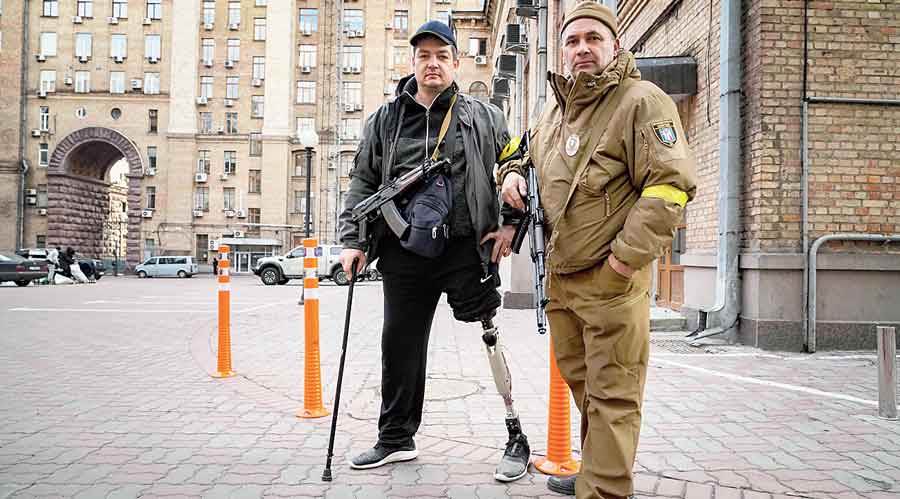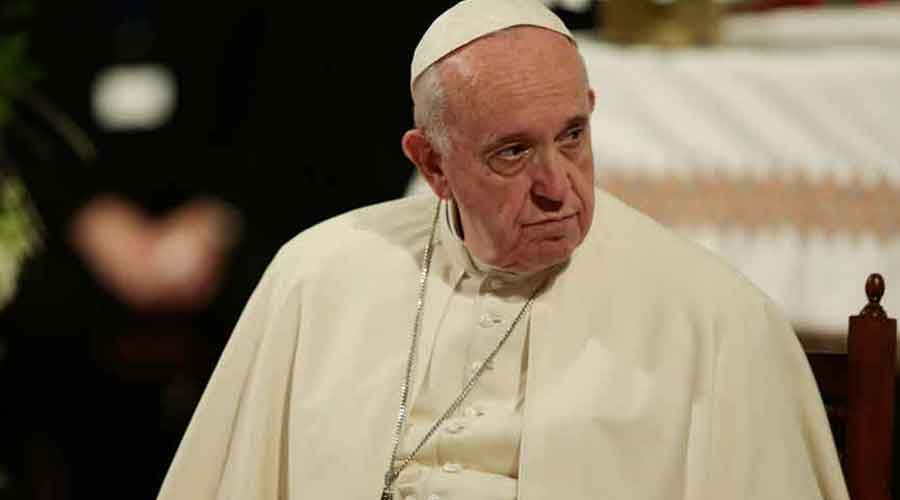Glass shards, bits of metal and shell casings, the detritus from a fierce and lethal street fight in Ukraine’s capital, Kyiv, lay scattered over hundreds of yards of pavement. Leading away from the site were bloody footprints.
The fighting, part of a seesaw battle over two nights in the northern parts of Kyiv, left Russian trucks and a tracked vehicle smouldering on a highway. And it signalled that, though vastly outgunned, Ukraine’s army and a growing corps of civilian volunteers are mounting a spirited defence of the capital.
While military experts say the odds are stacked against them, for now the combined Ukrainian defence forces have defied expectations by slowing and in some cases halting the Russian army’s advance, apparently upsetting Moscow’s war plans. After days of battle, Russia has yet to take any major cities.
(Russia’s defence ministry said on Sunday that Russian soldiers had been killed and wounded during an offensive in Ukraine. But the ministry added, without specifying any number, that its losses were far lower than those suffered by Ukraine.)
The change to a war footing has been swift, for some almost bewilderingly so. What just three days ago had been a bustling, modern European capital, with copious restaurants, bars and cafes, slipped into an eerie war footing faster than seemingly imaginable.
Vans and cars with armed men without uniforms careened along the streets. Checkpoints went up seemingly at every stoplight, with men and women in civilian clothes, carrying rifles, stopping cars.
“When I heard the explosions I decided that I am ready,” said Olena Sokolan, a business manager who received a rifle to help defend the capital. “I am adult woman, I am healthy and it’s my responsibility.”
The newly armed civilians and members of various paramilitary groups are fighting under the loose command of the military in an organisation called the Territorial Defence Forces.
“In the city itself, the territorial defence detachments are working quite effectively,” Mykhailo Podolyak, an adviser to the Ukrainian presidential chief of staff, said in a statement on Saturday morning. “It turned out that people are coming out, defending their homes. It wasn’t expected by analysts of the Russian General Staff.”
At an army recruitment centre where Kalashnikov rifles were being handed out, several dozen men milled about. Before receiving their guns, they were asked to form ad hoc units of about 10 men each and choose a commander, several of the men in line said.
One group was dressed in a motley assortment of sweatpants and camouflage jackets, some in tennis shoes and others in hiking boots. But they all bore yellow arm bands identifying them as members of the Territorial Defence Forces.
The new unit walked out the driveway of the recruitment centre and off into the city, where booms could be heard through the afternoon. “Glory to Ukraine!” the other men waiting for their rifles yelled. “Glory to its heroes!” the members of the new unit shouted back.
Men from their 20s to late 50s, from a range of backgrounds, showed up. Igor, 37, an economist for an online retailing company, who didn’t want his last name published for safety reasons, stood in line for his gun. He spoke at barely a whisper and his lips trembled. The dull thud of bombs or artillery could be heard in the distance.
“I never served in the army or with the police or anything,” he said. He said he hoped to be able to figure it out. He was worried, Igor said. “But people who are really afraid are sitting at home. They aren’t out here now.”
“Everybody in our country needs to defend — women, girls, everybody,” said Denis Matash, 33, the manager of Milk, a Kyiv nightclub, standing in line with about 50 other men at the recruitment centre. “I don’t think they understand where they came,” he said of the Russians. “Look at what is happening here.”
Grigory Mamchur, 40, who works as a male strip dancer at the Milk nightclub, part of the now shuttered but once booming nightlife scene in Kyiv, was also in line for a Kalashnikov.
“There wasn’t even anything to think about,” Mamchur said. “We will defend the country however we can. This could be our last chance.”
Whatever the efforts, military analysts and even Ukrainian generals speaking late last year have conceded the Ukrainian army has little chance of holding out for long and it’s unclear how civilians with assault rifles might stop artillery from bombarding the city or Russian tanks from rolling into the streets.
After a Saturday morning fight on the street that left burned Russian vehicles behind, the Ukrainian security and defence council secretary, Oleksy Danilov, issued a statement around 7am saying: “We are stopping the horde, so far as we can.”
But such assessments have not dented the determination of Kyiv’s citizens, who have protested or fought on their streets for independence twice before in this century, in 2004 and again in 2014.
Ihor Zhaloba, 58, a professor of history at a Kyiv university and a researcher at the Institute of History at the Ukrainian Academy of Sciences, said everybody in his family worried for him but nobody had asked him not to volunteer.
“My wife worried; I worried; everybody is worried,” he said in an interview at the recruitment centre. “But nobody told me not to do this, not my wife, not my daughters. They all think I should be here.”
New York Times News Service












